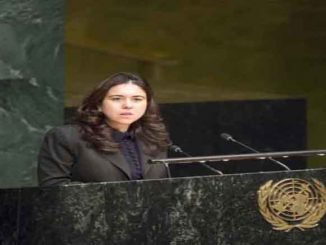
Mekameleen TV Channel has broadcast a leaked audio phone call for Egypt’s Intelligence Maj.General Wael al-Safty, officially responsible for the Palestinian Portfolio at Egypt’s General Intelligence Service, and Mohamed Dahlan, the former strongman of Fatah and the Palestinian Authority, who lives in the UAE.
The Leaked audio reflects Egypt’s stance from the Palestinian Authority and its leader Mahmoud Abbas and how Egypt’s General Intelligence deal with the Palestinian organization.
This is not the first time that Mekameleen, an Egyptian TV Channel, known for being anti-military coup, and pro-legitimacy (of Egypt’s first freely-elected President Mohamed Morsi, who was ousted on 3 July 2013 through a military coup, led by Al-Sisi).
In fact, the previous leaks were examined and authenticated by the leading British laboratory of forensic speech and acoustic analysis, JP French Associates, which is headed by Peter French, professor of forensic speech science at the University of York. The laboratory provides forensic voice analysis to the British courts, as well as advice and training to international law-enforcement agencies.
Moreover, in this latest leaked recording, the Egyptian high rank official’s voice was the only voice heard, without Dahlan’s responses. However, the person on the other end of the telephone was Dahlan, because he was referred to by his traditional Palestinian nickname, Abu Fadi.
After exchanging pleasantries, they began talking about someone who has ” no sufficient concentration”. Safty then said that this person “has nothing to offer”. The tapes go on to make clear that the man they are talking about is Abbas.
The Intelligence official said that Mahmoud Abbas doesn’t have the ability to think, realize or concentrate adding that his main aim is to remain in power.
Al-Safty also said that the Palestinian factions, which Abbas failed to contain have turned to be like Hamas, saying, “He could not even contain the other factions.” He continued, “These are the ones that Abu Mazen (Abbas’s nickname) couldn’t contain; these people drove me absolutely crazy, their positions have begun to be closer to Hamas.”
Al Safty said,” Fatah is extremely bad,” adding, “The Palestinian Liberation Organization is even worse.”
The Intelligence official described Abbas as being “not smart at all. He doesn’t have anything to offer,” “He can’t bring them (factions) together,” Safty tells Dahlan in utter exasperation. “I swear, he can’t bring them together.
“It’s stupidity,” he says, before again referring to Abbas’s advancing age, adding that the PA President does not have many laps left to run: “The track is running out, if you excuse the phrase.”
Then, both Dahlan and the intelligence official continued in mocking Abbas, Azzam al-Ahmed and the leaders of the Palestinian Authority. Al-Safty asked Dahlan, “Did you see the picture of Abu Nidaa (Azzam al-Ahmed) when he was eating?” “It was a scandalous image I swear, a scandal, a scandal, a scandal.”
Abu Nidaa is Azzam al-Ahmed, a senior Fatah member, who is a member of the Palestinian Legislative Council and the PLO ambassador to Iraq between 1974 and 2002. Al-Ahmed was simply eating a traditional Arab dish of lamb and rice with his hands at a banquet in Qatar.
Al-Ahmed has, however, publicly and vigorously condemned Arab involvement in Palestinian affairs.
Al-Safty also attacked Fatah movement that has ruled the Palestinian Authority since 1994. According to Mekameleen TV Channel, the date of the leaked audio goes back to last June.
The time of the recent leaks coincided with the latest visit of King Abdullah of Jordan to Cairo last August. The Jordanian King led a large delegation to meet Abdel Fatah al-Sisi where they discussed “the Palestinian arena, particularly the municipal elections for October 8, 2016, in the West Bank and Gaza (which were later suspended by the PA Supreme Court).
Al-Sisi and Abdullah were concerned in their meeting about the possibility that Hamas might win the intended elections, meaning that its power would spread from Gaza to the West Bank as well.
Moreover, if Hamas succeeded in strengthening its power in the West Bank, this could have dangerous implications on the Hashemite Kingdom’s stability where elections are scheduled for September 20, 2016. It is noteworthy that Hamas has strong ties with the Muslim Brotherhood in Jordan, where its political arm, the Islamic Action Front (IAF), is a major opposition force in Jordan.
Hamas constitutes a major threat to both countries, and the last meeting between Abdullah and al-Sisi was to negotiate the possible ways to face this upcoming threat.
Egypt, too, fears the possible strengthening of Hamas Resistance Movement as a regional force due to its close ties with the Egyptian Muslim Brotherhood, Turkey and Qatar. All of these actors represent a direct threat to the al-Sisi regime.
As a result, both Egypt and Jordan fear the strengthening of Hamas and its possible victory in the West Bank municipal elections “because of the deep division within the Fatah organization, particularly, the unbridgeable disputes between the party headed by Mohamed Dahlan and the other one headed by Palestinian Authority President Mahmoud Abbas.”
“Hence, in an extremely irregular fashion, al-Sisi and Abdullah issued a joint statement on the importance of the Palestinian problem and the need to achieve unity and resolve the disputes within Fatah itself.”
The statement reflects the Egyptian-Jordanian order of priorities: first the reconciliation within Fatah to prevent Hamas’ winning of the Municipal elections, and then the reconciliation between Fatah and Hamas.
The statement indeed called on Abbas to fix fences with his bitter rival Dahlan to enable Fatah to run for the elections in a unified form to prevent a victory for Hamas.
In fact, this is not the first time that al-Sisi has asked Abbas to mend his differences with Dahlan. However, this was always rejected because the Fatah Central Committee opposes the reconciliation.
However, it seems that King Abdullah has joined the al-Sisi demands ahead of the upcoming possible Hamas victory in the elections.
Dahlan, who resides today in Dubai, has good relations with both al-Sisi and Abdullah, and both of them would like to see him as the PA president after the 81-year old Abbas’ s retirement.
In response to the joint statement of the al-Sisi and King Abdullah, Abbas issued a statement through the Fatah Central Committee with a similar message. The statement calls for the unification of all members of the movement under the Fatah umbrella, in a way that will serve the Palestinian problem and the overall Palestinian situation in light of the sensitive stage that the Palestinian problem lives at the moment, a reality that requires the unification of the ranks.
In the same context, Muhammad Dahlan’s associates, headed by his right-hand man Samir al-Masharawi, welcomed both the joint statement of al-Sisi and Abdullah as well as the statement of the Fatah Central Committee.
However, it quickly emerged that the statement of the Abbas-led Fatah Central Committee was no more than lip service. The PA president has no intention to reconcile with his rival enemy Muhammad Dahlan.
The leaked audio infers that Abbas has not achieved any progress in arranging the Palestinian front.
In the same context, a joint Egyptian-Jordanian-UAE plan was reportedly pointing that the UAE -Egypt’s Gulf ally- plans to install Dahlan as the new PA president in the post-Abbas era.
Dahlan has been exiled from both Gaza and the West Bank, and has close ties wth the UAE monarchy.
In Gaza Strip, Dahlan is still hated for his attempted coup after Hamas’s electoral victory in 2007.
Last August, Abbas cracked down on weapons stockpiling as various factions were preparing for a post-Abbas landscape in the West Bank. Palestinian security officials and senior Fatah figures said that it was Dahlan who had sparked the arms race, by arming his followers in areas where he still retains support.



